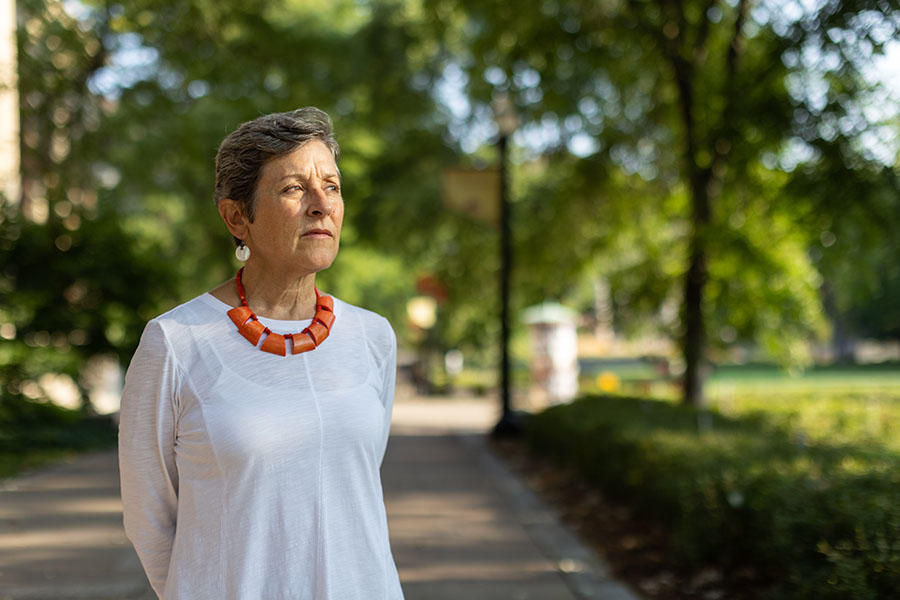Introduction
What most excites you about the SPH Strategic Plan for Antiracism?
“What I’m most excited about is that now that we have something down on paper and we’ve made the plan public, we can be held accountable. Without that kind of explicit, written commitment, it’s easy for us to ignore the plan, but that’s not going to be easy if members of the community can hold us accountable. I think it’s time that institutions like ours with a lot of resources, power, and skills are held accountable for doing work to dismantle racism.”
Commit
Using “commit” emphasizes a pledge to prioritize antiracist efforts in making SPH a more welcome, equitable, and just organization.
What do you see as your role in antiracism?
“As a sociologist I pay attention to systems of power — who has power and resources and who doesn’t — and how that manifests in health outcomes and opportunities to live a healthy life. The push and pull between personal agency or “choice” and structural constraints on people’s lives or “chance” are central to sociology and public health. For example, if you grow up in a low-income family in a low-income neighborhood your chances of a comfortable, healthy life are lower, even if you want to choose differently.
I’m trying really hard to pay attention to my own privilege. I’m a first generation college graduate and a female, and once I joined academia — in what was then a male-dominated field — I really felt like I was the misfit and didn’t have power. Over the years, I have come to realize just how much power I have as a faculty member and as a white person and that I am accountable for using the power and influence I have to bring about change.”
What have you done already to combat racism?
“My work over the years with the SPH Health Equity Work Group has been incredibly rewarding.
On a more personal level, I come from a farm family. There are a lot of misconceptions about this nation’s history that I am trying to make sure my relatives know about in a way that they can hear.
When I hear racist, classist, anti-immigrant and anti-welfare comments, I remind them that our grandparents, German immigrants, were not considered white at one point. We were made to feel less than because of our ancestry and language. In fact, my grandfather didn’t learn English until he went to school. We clung together in communities of fellow Germans to feel safe and accepted. And my family was able to buy land from the government to build wealth — land that was stolen from Native Americans. I remind them that this land was not ours, and it wasn’t the government’s to begin with, and the people whose land we inhabit were forced off it. My family benefitted from this government support, building family wealth and health.
We’re not very good at knowing our own history and for many generations our historical narratives have been whitewashed. Without knowing the full story, it’s easy to be proud of ourselves and our accomplishments as white people, even if that success was made possible through theft on the backs of other people.”
Challenge
We are “challenged” to accept that racism exists and to “challenge” it when we see it.
What challenges do we face in prioritizing antiracist efforts?
“Fear of making mistakes and fear of losing something. Nobody likes to make mistakes, but if we don’t try — knowing that we’ll make mistakes along the way — we’re never going to make an impact. The myth of scarcity makes us think that there is not enough to go around…into not sharing instead of working to make sure there is enough to go around and to give everyone an equal chance.”
Change
We have to be willing to “change” and shift our beliefs, attitudes, and actions toward equity and justice.
What is your vision for an antiracist school of public health?
“I would love to see a future where everybody, no matter what their background or identities, comes to this school of public health feeling appreciated, accepted for who they are, and confident that this is a place where they can teach, learn and grow. It is a place where everyone can thrive, not just survive.”
“Building Equity, Driving Justice: Commit | Challenge | Change” — ties all communications related to the SPH Strategic Plan for Antiracism together under one look and feel. The theme showcases our guiding principles, and it motivates and inspires. "Agents for Change" profiles support this theme and all interview questions are related to the action words, Commit, Challenge, Change, as described above.
Submit an idea for this profile series — either your own story, or one that inspires you from another SPH individual or group.

